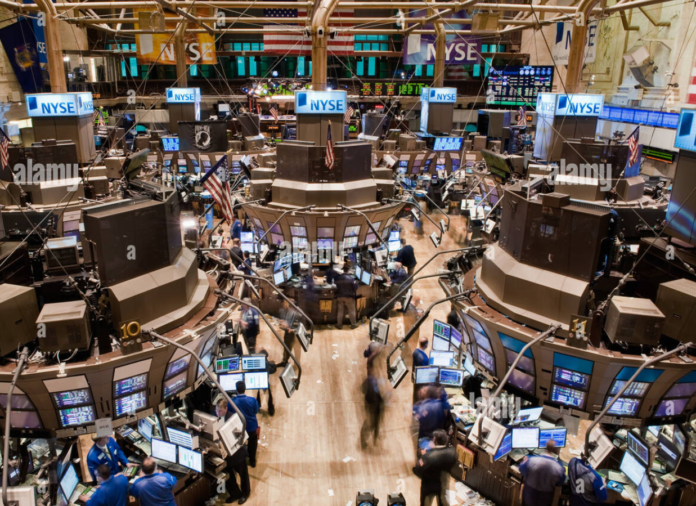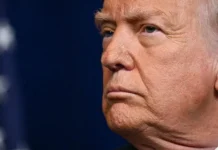Global equity markets declined on Monday, while safe-haven gold surged to a new record high after U.S. President Donald Trump announced that tariffs would apply broadly to nearly all countries. His remarks heightened concerns that an escalating global trade war could trigger a recession.
Speaking to reporters aboard Air Force One, Trump’s statement dampened expectations that the tariffs would be restricted to a select group of nations with the most significant trade imbalances.
On Wall Street, benchmark S&P 500 and the Dow reversed losses in early trade and finished higher with gains in consumer staples, financials, materials and energy stocks. The Nasdaq ended down. All three indexes notched both quarterly and monthly losses.
“What the Trump administration has shown us so far is that you should not expect a consistent approach,” said George Lagarias, chief economist at Forvis Mazars.
“This is what scares the market the most. Inconsistency breeds uncertainty, and markets hate uncertainty.”
The Dow Jones Industrial Average (.DJI) climbed 1.00%, closing at 42,001.76, while the S&P 500 (.SPX) gained 0.55%, reaching 5,611.85. In contrast, the Nasdaq Composite (.IXIC) dipped 0.14% to 17,299.29.
In Europe, the STOXX 600 (.STOXX) dropped 1.51%, marking its lowest level in nearly eight weeks. Major indices in Frankfurt (.GDAXI), London (.FTSE), and Paris (.FCHI) also saw declines ranging between 1.7% and 2%. Meanwhile, MSCI’s broad Asia-Pacific index (.MIAPJ0000PUS) excluding Japan slid 1.9%.
Analysts at Goldman Sachs have raised the likelihood of a U.S. recession to 35%, up from their previous estimate of 20%. They anticipate that Trump will announce new tariffs averaging 15% across all U.S. trading partners on April 2.
Economic data released on Friday highlighted growing risks, as a key core inflation measure rose higher than expected in February, while consumer spending fell short of forecasts.
That raised the stakes for the March payrolls report due on Friday, where any outcome below the 140,000 gain expected would only add to recession fears.
“The current market narratives center on this fear of stagflation, which conceptually could be the worst possible combination for stocks,” said Talley Leger, chief market strategist at The Wealth Consulting Group in New Jersey.
“So in a slowing growth environment, earnings would decelerate, or even collapse in a recession. That’s another big fear in the market. And on the other side, spiralling inflation would squeeze stocks on the valuation channel.”
Gold prices extended their stellar run, hitting another record high of $3,128.06. Spot gold rose 1.31% to $3,124.34 an ounce, while U.S. gold futures rose 1.2% to settle at $3,150.30.
In currency markets, the dollar pared early losses to strengthen against the Japanese yen and the euro amid the uncertainty around tariffs.
Against the Japanese yen , the dollar strengthened 0.07% to 149.93. The euro was down 0.11% at $1.0815. Against the Swiss franc , the dollar strengthened 0.48% to 0.884 franc.
The dollar index , which measures the greenback against a basket of currencies, including the yen and the euro, rose 0.17%.
Bond investors seemed to be betting the slowdown in U.S. economic growth will outweigh a temporary lift in inflation and prompt the Fed to cut rates by about 80 basis points this year.
The yield on benchmark U.S. 10-year notes fell 3.5 basis points to 4.221%. In Europe, the yield on the benchmark German 10-year Bunds rose 0.9 basis points to 2.738%.
The outlook for rates could become clearer when Fed Chair Jerome Powell speaks on Friday, following a host of other Fed speakers this week.
Brent rose 1.5% to settle at $74.74 a barrel, while U.S. West Texas Intermediate crude rose 3.1% to settle at $71.48 as Trump threatened secondary tariffs on buyers of Russian oil if he felt Moscow was blocking efforts to end the war in Ukraine.



















